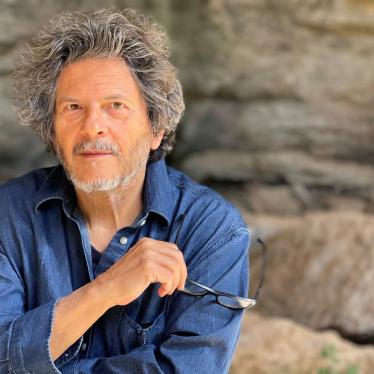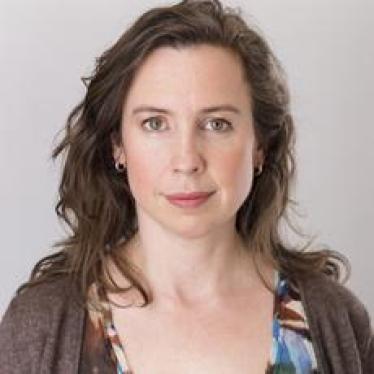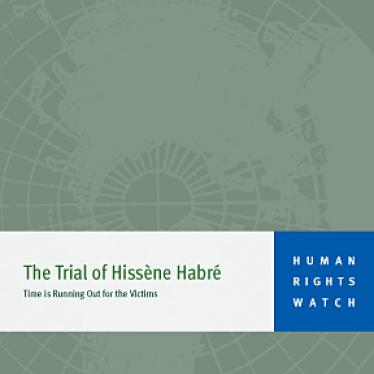Sifting through the thousands of documents strewn across the floors of an abandoned secret police headquarters in Chad, Reed Brody glimpsed the violent, final moments of Rose Lokissim’s brave life.
Brody, counsel for Human Rights Watch, first heard about Rose from survivors of the brutal regime of Chad’s former dictator Hissène Habré. A prisoner herself, Rose had been a vital source of information to families – quietly informing them when one of their relatives had been detained, delivering clandestine messages. Ultimately, the secret police learned of her actions and murdered her.
But it was one of the secret police documents that he and his Human Rights Watch colleague, Olivier Bercault, found in the abandoned headquarters of Habré’spersonal Gestapo that gave Brody true insight into Rose’s staunch belief in justice.
As Rose’s interrogating officer wrote, Rose didn’t care what happened to her. Even if she were killed in custody, the interrogator wrote of Rose’s stance, “Chad will thank her and history will talk about her.”
“One of my missions is to make sure that history does talk about her,” Brody said. “To take this report by the interrogators who tortured and killed her, and use her words to make it come true.”
“Hissène Habréis the most brutal US-backed dictator you’ve never heard of,” says Brody. Habré had thousands killed and used torture systematically during his bloody eight-year reign, before being ousted in 1990. Habré oversaw waves of ethnic cleansing and even had a prison in his backyard, yet the United States and France backed him as a counterweight to his northern neighbor, Libya’s Muammar Gaddafi.
Finally, on June 30 of this year, after what the Toronto Globe and Mail called “one of the world’s most patient and tenacious campaigns for justice,” Habré was arrested in Senegal, where he has lived in comfortable exile for 22 years. He is to be tried in Senegal for crimes against humanity committed in Chad.
Brody learned of the arrest from a text message from Senegal that Sunday morning. One of the first people he thought of was Rose.
Brody joined Habré’s victims in the battle to bring the strongman to justice more than 14 years ago. By then, some people in Chad, like Souleymane Guengueng, a torture survivor turned activist, had compiled the files and testimony of 792 victims.
The nail in the coffin was the evidence in Habré’s abandoned secret police headquarters in N’Djaména, where they found Rose’s file.
“Inside the building we stumbled upon room after room strewn with documents, on the floors, on the stairs,” he said. “We started picking up the documents and realized they were the files of Habré’s political police.
In all, the documents contained the names of 1,208 people, including Rose, who were killed or died in detention, and 12,321 victims of human rights violations. The Chadian Victims’ Association spent six months putting together these documents.
“They provided a road map to Habré’s oppression – how many people were in jail on any given day, how many people died in jail,” Brody said. “They allowed us to give people their family members’ death certificates. We could help many families learn what happened to their loved ones.”
Despite this evidence, the authorities in Senegal refused to bring Habré to justice. For the past 14 years, Brody and the victims’ lawyer, Jacqueline Moudeina, have played a legal game of cat-and-mouse with Habré, with fresh hope plummeting to disappointment numerous times.
Habré isn’t the only former ruler Brody has challenged. He helped craft the legal arguments to keep Chile’s Augusto Pinochet in detention in London in 1998 and is working to see Haiti’s “Baby Doc” Duvalier behind bars. He wrote the Human Rights Watch report calling for a criminal investigation of former president George W. Bush for war crimes and torture. In his office hangs a world map with black and white headshots of dictators and alleged torturers tacked to it. “They should all be brought to justice,” he said. His work on these cases has been the subject of four documentaries including “The Dictator Hunter.”
Brody thought they had Habré under lock and key 13 years ago. Near the very beginning of their effort, Brody and the victims had convinced Senegal’s authorities to arrest him. “Obviously, it was a real high,” he said. “It looked like this brave new world where we would use the law to obtain justice for victims.”
It came crashing down only a couple of months later, after Senegal elected a new president, Abdoulaye Wade. “When Wade announced that his chief legal adviser would be Habré’s lawyer, we knew we were in trouble,” Brody said. “Then Wade said Senegal would not prosecute Habré.”
It had all gone awry, but they refused to give up. “It didn’t occur to me at the time that it would take thirteen-and-a-half years for the case to start going forward again.”
Now that Habre is finally behind bars, Brody has a new goal: To use his research about Habré’s alleged crimes as evidence at his trial, which he hopes will be “a turning point for justice in Africa.”
It was a 1984 vacation to Nicaragua to visit a friend that started Brody on the path of human rights work. He wasn’t just looking for relaxation on this trip – it was only a few years after the Sandinista revolution toppled the ruling Somoza family, and he wanted to see this altered country first-hand.
His friend, a priest, lived in the northern village of El Jícaro, near the Honduras border. During Brody’s visit, his friend hosted two days of meetings with the regional Catholic lay-leadership. About a dozen people traveled from the mountains to attend, and they brought with them terrible stories from their villages, of schools and farms being burned and of teachers and doctors being shot. These crimes, they said, were committed by the Contras, a federation of US-backed rebel groups seeking to undermine the revolution.
Brody knew the United States funded the Contras, but he had never heard the US media report on any serious crimes committed by the rebels. “I just felt this enormous responsibility to do something,” he said.
After returning to the states, he quit his job as a lawyer at the New York Attorney General’s Office and returned to Nicaragua, where he spent the next five months traveling by bus or pickup truck with local Catholic priests, whom the villagers knew and trusted, asking people for their stories. “I took statements, typed them up, and had the person I was interviewing read them and sign them,” he explained. “I collected hundreds of affidavits.”
Back in the United States, and a couple of weeks before Brody released his report, Ronald Reagan described Nicaragua’s Contras as the “moral equivalent of our founding fathers.” Then his report detailing the Contra’s crimes came out – it made the front page of The New York Times. It also became an important piece of a campaign to stop US assistance to the Contras, helping change the terms of the debate. Two months after Brody’s report, Contra aid was cut off, though it was later restored.
After Nicaragua, Brody took a job with the International Commission of Jurists in Geneva, wrapping up his time there in 1991 when he assisted the post-Communist Mongolian government in preparing its constitution. Later, he spent years working for various UN agencies or nonprofits in El Salvador, Guatemala, Haiti, Tibet, Sierra Leone, and the Democratic Republic of Congo. All were countries with severe human rights issues created by war and the abuse of power.
Brody joined Human Rights Watch in 1998 – the year he began focusing on bringing dictators to justice, thanks to Pinochet, who for him loomed large as the prototypical Latin American dictator of the ‘70s and ‘80s.
Brody was at a Human Rights Watch retreat on October 16 when someone announced that Pinochet had been arrested. But it’s how he was arrested that captured the attention of everyone in the room. Pinochet, Chile’s dictator, was arrested in London on a warrant issued by a Spanish judge. It meant that people were circumventing Chile’s own legal system, where the former strongman was protected by an amnesty and parliamentary immunity. It was a historic breakthrough. If this case could be successfully prosecuted, any dictator who controlled the courts in his homeland could be brought to justice elsewhere.
Pinochet challenged his extradition to Spain in the British courts, and Brody flew to London to support the extradition. He planned to stay for a few days and ended up being there the better part of eight months. The case reached the British House of Lords, then the land’s highest court, where Amnesty International and Human Rights Watch were permitted to intervene as parties. When the judges decided that the extradition could go forward despite Pinochet’s status as former head of state, human rights activists had a new legal tool to bring abusive dictators to justice.
“That was a very heady moment,” he said. “As a human rights lawyer, you’re used to being legally and morally right, but still losing. In the Pinochet case, not only did we win, but we maintained the detention of one of the most iconic dictators in the world.”
People from all over the globe began to approach Brody about their abusive dictators, their “Pinochets.”
It was the head of the Chadian Association for Human Rights, Delphine Djiraibe, who convinced Brody in 1999 to help the victims go after Habré, who had fled to Senegal. Under the Pinochet precedent, Senegal could try him there. Brody knew Senegal saw itself as a region leader in human rights, and saw an opportunity for the country to prove itself.
But Senegal bided its time. The case has nearly died 10 times.
Habré’s first indictment came in February 2000, shortly after Brody began working on the case. But then came the election, and within a few months the Senegalese courts threw out the case. Then Brody secured a UN order to keep Habré in Senegal while he helped the victims seek justice in Belgium. When Senegal refused to extradite Habre to Belgium in 2005, and gave the case to the African Union -- full of dictators itself -- Brody got the case sent back to Senegal. When Senegal again stalled, Brody and his team got Belgium to haul Senegal before the International Court of Justice (ICJ). Last year, the ICJ ordered Senegal to move forward and the new Senegalese president, Macky Sall, agreed. Finally, this year, Senegal created a special court to try Habré in Dakar.
As The New York Times wrote, Habré’s “case has proved unusual for the tenacity of his victims, and of Human Rights Watch, in seeking to bring him to justice.”
“There were so many moments where I started to believe it might not happen,” Brody admitted. “But at some point it becomes an act of faith. I can’t tell you how many people have told us over the years that this is never going to happen, you don’t understand anything about Africa, anything about Senegal, just give it up. But we used this criticism as fuel. In a sense, we were trying to prove that it could be done.”
“When I think back, I first began working on this case because of a theoretical idea – as a lawyer, I wanted to expand the Pinochet precedent, trying a dictator outside of his home country,” Brody said. “But then you start working with the victims,” the people who Habré had tortured, whose family members were killed, whose villages were devastated. “Now, I want to win the case for them.” And for Rose, so history will talk about her.









